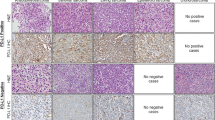Abstract
Background
The aim of this study was to investigate the expression of cell cycle regulators p53, p16, cyclin-D1, and retinoblastoma (Rb) gene protein in leiomyosarcoma of the peripheral soft in order to identify expression profiles potentially useful for clinical prognostic purposes.
Materials and Methods
A tissue microarray representing 70 localized leiomyosarcomas of the limbs and limb girdles was created with 3 representative cores from each tumor. Immunohistochemical staining was performed for p53, p16, cyclin-D1, and Rb using standard techniques. Staining was scored as either absent-low (<20% of neoplastic cells) or moderate-diffuse (≥20%). Outcome analysis was performed for local recurrence-free survival (LFS), metastatic disease-free survival (MDFS), and disease-specific survival (DSS).
Results
Kaplan–Meier analysis of survival revealed that no single alteration of the factors examined was associated with outcome, but tumors showing concomitant alteration of p16 and p53 were characterized by reduced MDFS and DSS (P = 0.01 and P < 0.001, respectively). In addition, patients who received adjuvant therapy consisting of radiotherapy alone or radiotherapy and chemotherapy had a better DSS than those receiving surgery alone or surgery and chemotherapy (P = 0.05). In multivariate analysis, altered p16/p53 remained the only parameter predictive of MDFS and DSS (P = 0.048, hazard ratio [HR] = 2.488, 95% confidence interval [95% CI] 1.006–5.116; P = 0.043, HR = 2.498, 95% CI 1.029–5.909, respectively).
Conclusions
Accumulation of cell cycle alterations represents a prognostic indicator in localized soft tissue leiomyosarcoma, and in particular altered p16/p53 expression is associated with an unfavorable prognosis. This may help the clinical management of patients with leiomyosarcomas.


Similar content being viewed by others
References
Svarvar C, Bohling T, Berlin O, Gustafson P, Follerås G, Bjerkehagen B, et al. Clinical course of non visceral soft tissue leiomyosarcoma in 225 patients from the Scandinavian Sarcoma Group. Cancer. 2007;109:282–91.
Massi D, Beltrami G, Mela MM, Pertici M, Capanna R, Franchi A, et al. Prognostic factors in soft tissue leiomyosarcoma of the extremities: a retrospective analysis of 42 cases. Eur J Surg Oncol. 2004; 30:565–72.
Sherr CJ. The Pezcoller lecture: cancer cell cycles revisited. Cancer Res. 2000;60:3689–95.
Patterson H, Gill S, Fisher C, Law MG, Jayatilake H, Fletcher CD, et al. Abnormalities of the p53 MDM2 and DCC genes in human leiomyosarcomas. Br J Cancer. 1994;69:1052–8.
Dei Tos AP, Maestro R, Doglioni C, Piccinin S, Libera DD, Boiocchi M. Tumor suppressor genes and related molecules in leiomyosarcoma. Am J Pathol. 1996;148:1037–45.
Konomoto T, Fukuda T, Hayashi K, Kumazawa J, Tsuneyoshi M. Leiomyosarcoma in soft tissue: examination of p53 status and cell proliferating factors in different locations. Hum Pathol. 1998;29:74–81.
Kawaguchi K, Oda Y, Saito T, Yamamoto H, Tamiya S, Takahira T, et al. Mechanisms of inactivation of the p16INK4a gene in leiomyosarcoma of soft tissue: decreased p16 expression correlates with promoter methylation and poor prognosis. J Pathol. 2003;201:487–95.
Guillou L, Coindre JM, Bonichon F, Nguyen BB, Terrier P, Collin F, et al. Comparative study of the National Cancer Institute and French Federation of Cancer Centers Sarcoma Group grading systems in a population of 410 adult patients with soft tissue sarcoma. J Clin Oncol. 1997;15:350–62.
Enneking WF, Spanier SS, Goodman MA. A system for the surgical staging of musculoskeletal sarcoma. Clin Orthop Relat Res. 1980;153:106–120.
Yang J, Du X, Chen K, Ylipää A, Lazar AJ, Trent J, et al. Genetic aberrations in soft tissue leiomyosarcoma. Cancer Lett. 2009;275:1–8.
Otaño-Joos M, Mechtersheimer G, Ohl S, Wilgenbus KK, Scheurlen W, Lehnert T, et al. Detection of chromosomal imbalances in leiomyosarcoma by comparative genomic hybridization and interphase cytogenetics. Cytogenet Cell Genet. 2000;90:86–92.
Mandahl N, Fletcher CD, Dal Cin P, De Wever I, Mertens F, Mitelman F, et al. Comparative cytogenetic study of spindle cell and pleomorphic leiomyosarcomas of soft tissues: a report from the CHAMP Study Group. Cancer Genet Cytogenet. 2000;116:66–73.
Bates S, Parry D, Bonetta L, Bates S, Parry. Absence of cyclin D/cdk complexes in cells lacking functional retinoblastoma protein. Oncogene. 1994;9:1633–40.
Müller H, Lukas J, Schneider A, Warthoe P, Bartek J, Eilers M, et al. Cyclin D1 expression is regulated by the retinoblastoma protein. Proc Natl Acad Sci USA. 1994;91:2945–9.
Drobnjak M, Latres E, Pollack D, Karpeh M, Dudas M, Woodruff JM, et al. Prognostic implications of p53 nuclear overexpression and high proliferation index of Ki-67 in adult soft-tissue sarcomas. J Natl Cancer Inst. 1994;86:549–54.
Pollock R, Lang A, Ge T, Sun D, Tan M, Yu D. Wild-type p53 and a p53 temperature-sensitive mutant suppress human soft tissue sarcoma by enhancing cell cycle control. Clin Cancer Res. 1998;4:1985–94.
Zhang L, Yu D, Hu M, Xiong S, Lang A, Ellis LM, et al. Wild-type p53 suppresses angiogenesis in human leiomyosarcoma and synovial sarcoma by transcriptional suppression of vascular endothelial growth factor expression. Cancer Res. 2000;60:3655–61.
Sharpless NE, Alson S, Chan S, Silver DP, Castrillon DH, DePinho RA. p16INK4a and p53 deficiency cooperate in tumorigenesis. Cancer Res. 2002;62:2761–5.
Voorhoeve PM, Agami R. The tumor-suppressive functions of the human INK4A locus. Cancer Cell. 2003;4:311–9.
Peterson EJ, Bogler O, Taylor SM. p53-mediated repression of DNA methyltransferase 1 expression by specific DNA binding. Cancer Res. 2003;63:6579–82.
Author information
Authors and Affiliations
Corresponding author
Rights and permissions
About this article
Cite this article
Panelos, J., Beltrami, G., Scoccianti, G. et al. Prognostic Significance of the Alterations of the G1-S Checkpoint in Localized Leiomyosarcoma of the Peripheral Soft Tissue. Ann Surg Oncol 18, 566–571 (2011). https://doi.org/10.1245/s10434-010-1226-6
Received:
Published:
Issue Date:
DOI: https://doi.org/10.1245/s10434-010-1226-6




